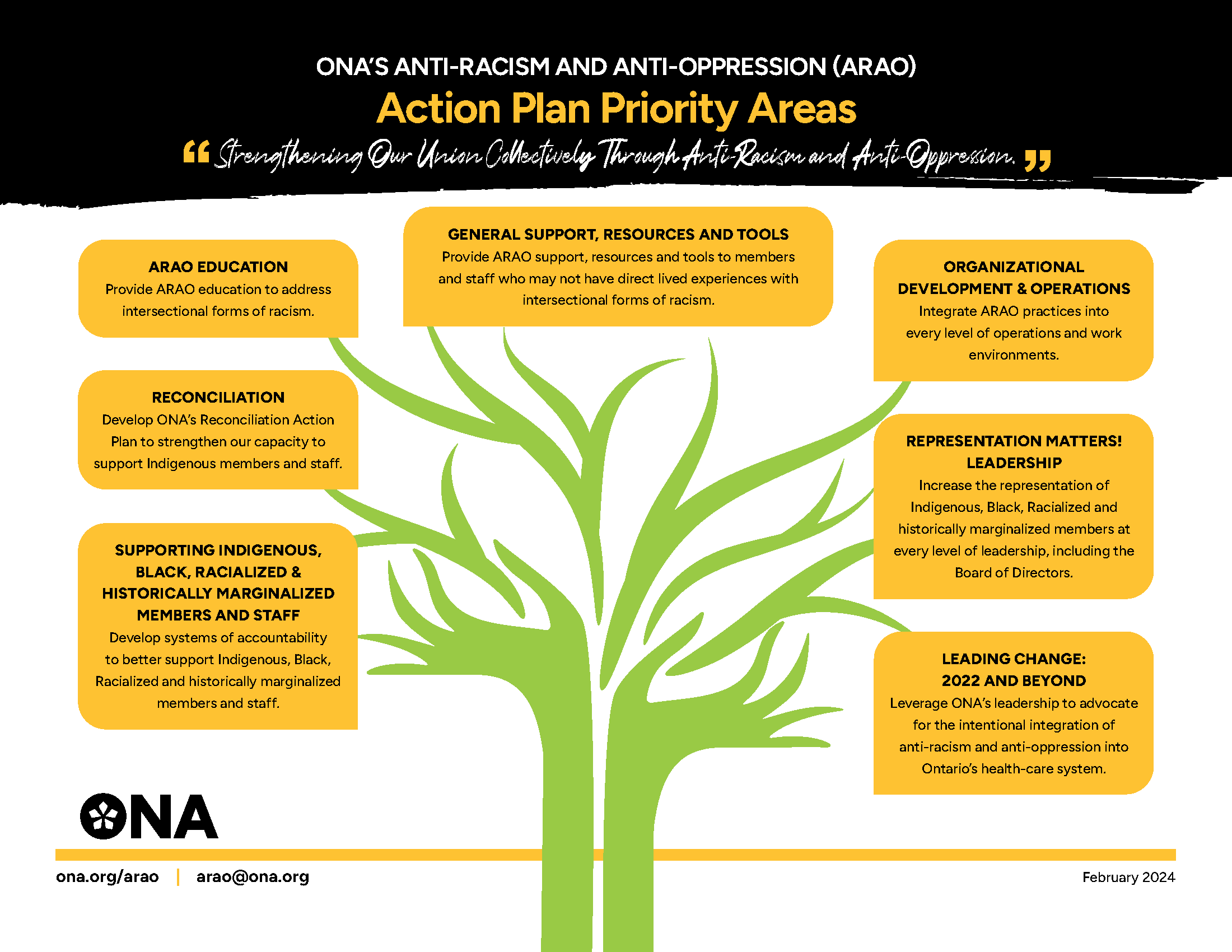
The Ontario Nurses’ Association has launched a four-year action plan that will help guide our union in addressing the ongoing racism and oppression that exists for so many of our members and staff, and within our communities.
The 2022-2026 Anti-Racism and Anti-Oppression (ARAO) Action Plan is the direct result of a call to action from our members, leaders and staff with lived experiences of intersectional forms of racism, including anti-Indigenous racism, anti-Black racism, discrimination and acts of exclusion. The Action Plan contains seven priority areas and 35 action items.
Read the full plan in English below, in French here, or download a PDF copy.
![]() As an organization, ONA has traditionally used a human rights and equity approach to guide our work. It is our belief that every member and employee has the right to equal treatment and freedom from discrimination and harassment in the workplace and the union. While this continues to be a core tenet of our work, we recognize that we need to use an anti-racism and anti-oppression (ARAO) approach to identify and address intersectional forms of racism (e.g., anti-Black racism, anti-Indigenous racism), and advance equity.
As an organization, ONA has traditionally used a human rights and equity approach to guide our work. It is our belief that every member and employee has the right to equal treatment and freedom from discrimination and harassment in the workplace and the union. While this continues to be a core tenet of our work, we recognize that we need to use an anti-racism and anti-oppression (ARAO) approach to identify and address intersectional forms of racism (e.g., anti-Black racism, anti-Indigenous racism), and advance equity.
An ARAO approach focuses on the different ways people from Black, Indigenous, racialized and historically marginalized groups experience racism, including its impact on their day-to-day lives. Integrating this approach into our work at ONA will provide us with the guidance we need to review our organizational structures, policies, procedures, practices and actions. It will also help us develop remedies and preventative measures.
It is for these reasons that ONA is moving forward on an anti-racism and anti-oppression journey shaped and informed by where we have been, critically reflecting on where we are, and moving beyond good intentions to reimagine where we are going as advocates for workers’ rights, health equity, inclusion and human rights. We recognize that the intersections of racism, gender, age, socio-economic status, housing, geographic location and other social determinants of health, leave Black, Indigenous, racialized and historically marginalized communities at increased risk of exclusion and diminished health outcomes within Ontario’s health-care system.1 These systems of racism and oppression are rooted in legacies of colonization, slavery, White2 supremacy, sexism and injustices. For example, we are witnessing how racism and exclusion continue to have a detrimental impact on historically marginalized communities during the COVID-19 pandemic.3
We are heeding the call to action by our members, staff, elected leaders and managers who have lived experiences with intersectional forms of racism, including anti-Indigenous racism, anti-Black racism, discrimination and acts of exclusion. In “Unveiling the Truth: The Thoughts and Experiences of ONA Members,” we heard our members share their insights about racism, its impact on them and their colleagues and communities, and the need for ONA to take action because “this [racism] is wrong…this is injustice…it’s like screaming underwater and …not being heard.”4
We know that without individual and collective action, racism in all its different forms will continue to threaten the health and safety of so many in our profession, work environments, and in the communities we call home. ONA’s Board of Directors fully supports this work, and they approved ONA’s four-year Anti-Racism and Anti-Oppression Action Plan.
1 Refer to the following documents and videos for discussions about racism and other social determinants of health: ONA, Unveiling the Truth: The Thoughts and Experiences of ONA Members (August 6, 2020); Centers for Disease Control and Prevention, Health Equity, Racism and Health (November 24, 2021);
2 The EDI Consultant capitalizes White to reflect the changing style used by the American Psychological Association (APA) and the MacArthur Foundation.
Please refer to these two links that explain the shift to capitalize White: 1) https://apastyle.apa.org/style-grammar-guidelines/bias-free-language/
racial-ethnic-minorities and 2) www.macfound.org/press/perspectives/capitalizing-black-and-white-grammatical-justice-and-equity.
3 ONA, Beyond Good Intentions: Confronting Racial Discrimination through Solidarity Position Statement on Anti-Racism (June 2020).
4 Excerpt from Ingrid Garrick’s guest panellist comments in ONA’s Unveiling the Truth: The Thoughts and Experiences of ONA Members (August 6, 2020).
Purpose of the ARAO Action Plan
![]() To assist us through its journey, we developed a four-year, 2022-2026, ARAO Action Plan with seven priority areas and 33 action items that will guide us forward as we build our infrastructure, challenge systemic racism and strengthen internal capacity, to integrate evidence-based anti-racism and anti-oppression practices into every level of ONA’s services, work environments, workplace culture and leadership.
To assist us through its journey, we developed a four-year, 2022-2026, ARAO Action Plan with seven priority areas and 33 action items that will guide us forward as we build our infrastructure, challenge systemic racism and strengthen internal capacity, to integrate evidence-based anti-racism and anti-oppression practices into every level of ONA’s services, work environments, workplace culture and leadership.
This plan will also help ONA develop tools and resources to evaluate its existing systems, services, education, policies, procedures and practices.
Acknowledgments
The design and development of the 2022-2026 ARAO Action Plan was led by the ARAO Working Group and ONA’s Lead Consultant, Tomee Elizabeth Sojourner-Campbell. The Action Plan was shaped by the expertise and insights of the Member Anti-Racism Advisory Team (ARAT) and the Staff Diversity, Equity and Inclusion (SDEI) Committee.
![]()
Meet the ARAO Working Group
ARAO Working Group Members
Dawn Armstrong, Vice-President Region 1, Human Rights and Equity (HRE)
Portfolio Chair, ARAT
Chair, HRE Team
Aileen Edwards, Executive Lead Human Resources
Chair, SDEI Committee
Tomee E. Sojourner-Campbell, ARAO Lead Consultant
Kieran Maxwell, HR ARAO Specialist
Amleek Mahngar-Kainth, ARAO Coordinator | Full-time secondment from Member Education Team
Sophia Ruddock, ARAO Coordinator | Part-time secondment from Legal Expense Assistance Plan (LEAP) Team
Pauline Lefebvre-Hinton, ARAO Coordinator | Part-time secondment from Litigation Team
Lisa Siciliano, Assistant to Sr. Executive, Negotiations/Chief Negotiator | Administrative Assistant, HRE Team & ARAT
ARAT Members
ONA Leadership
Cathryn Hoy, President, and Interim Chief Executive Officer (CEO) (ex officio)
Dawn Armstrong, Vice-President Region 1, HRE Portfolio, Chair, ARA and HRE Teams
ONA Members
Angel Paniagua-Perez
April Kakekagumick
Brittany Hertz
Cheshta Sharma
Ingrid Garrick
Monica Paola Rivas Barbosa
ONA Staff
Aileen Edwards
Amleek Mahngar-Kainth
Kieran Maxwell
Lisa Siciliano
Pauline Lefebvre-Hinton
Sophia Ruddock
Implementation of the ARAO Action Plan
![]() The primary internal stakeholder for this Action Plan is the Member ARAT. The team’s mandate is to provide the Board of Directors with recommendations focused on proactive short- and long-term steps to address and take action against racial discrimination. The SDEI Committee will be involved in the implementation of aspects of the plan relevant to ONA staff and management.
The primary internal stakeholder for this Action Plan is the Member ARAT. The team’s mandate is to provide the Board of Directors with recommendations focused on proactive short- and long-term steps to address and take action against racial discrimination. The SDEI Committee will be involved in the implementation of aspects of the plan relevant to ONA staff and management.
2022-2026 ARAO Action Plan has Seven Priority Areas
 Reconciliation
Reconciliation- ARAO Education
- Supporting Indigenous, Black, Racialized & Historically Marginalized Members, Staff, Management and Elected Leadership
- General Supports, Resources and Tools
- Organizational Development and Operations
- Representation Matters! Leadership
- Leading Change-2022 and Beyond
We acknowledge that the priorities will develop, shift and undergo revisions over the next four years.
This Action Plan is the first of its kind for ONA. It is a living document, meaning it will change over time based on known and unknown factors. It is an exciting time in our ONA’s 50-year history. The action plan is also a way for membership, elected leaders, staff and senior management to engage in transformative and forward-thinking change to address and prevent systemic intersectional forms of racism.
 PRIORITY 1 – Reconciliation
PRIORITY 1 – Reconciliation
To challenge anti-Indigenous racism.
Build cultural competency and cultural safety.
Support Indigenous members, elected leaders, staff and management.
Key Action Items
- Hire an Indigenous Consultant as Lead Reconciliation Plan Consultant.
- Develop a Multi-Year Reconciliation Plan.
- Create an education program focused on decolonization and reconciliation.
- Develop a communications strategy.
- Develop tools and resources.
- Develop metrics to measure, monitor and evaluate the Reconciliation Plan.
Priority one aligns with ONA’s 2021-2026 Strategic Plan Priorities and Actions: Priority 2 – Members Supported – Actions 6, 7 and 8; Priority 4 – Telling Ontarians the Truth – Actions 14 and 15; and Priority 5 – Everyone Includes – Actions 16, 17, 18 and 19.
 PRIORITY 2 – ARAO Education
PRIORITY 2 – ARAO Education
To increase awareness about the detrimental impact of systemic racism, exclusion and other forms of discrimination on historically marginalized communities, nursing as a profession and Ontario’s health-care services.
To create learning and working environments that affirm the professional, social, cultural and economic contributions of all members, including Black, Indigenous, racialized and historically marginalized members, elected leaders, staff and management.
To create spaces of cultural safety for Black, Indigenous and racialized professionals with lived experiences.
To deepen understanding of how social location, personal values and beliefs impact decision-making, actions, behaviours and interactions with union colleagues, co-workers, managers, senior leaders and in communities.
Key Action Items
- Design, develop and implement multi-year ARAO education programs for members, elected leaders, staff and management.
- Develop modules on ARAO topics, including Addressing Anti-Black and Anti-Indigenous Racism and Strengthening Solidarity using ARAO.
- Develop ARAO tools and resources to strengthen communication, interpersonal relationship, critical decision-making and team-building skills.
- Create learner and leadership virtual hubs.
- Create assessment tools to support the learning process.
Priority two aligns with ONA’s 2021-2026 Strategic Plan Priorities and Actions: Priority 2 – Members Supported – Actions 6, 7 and 8; Priority 3 – Stronger Bargaining Units – Actions 9-12; Priority 4 – Telling Ontarians the Truth – Actions 14 and 15; Priority 5 – Everyone Includes – Actions 16, 17, 18 and 19; and Priority 6 – Enabling Priority: Our Work, For You – Actions 20-22.
 PRIORITY 3 – Supporting Indigenous, Black, Racialized & Historically Marginalized Members, Staff, Management and Elected Leadership
PRIORITY 3 – Supporting Indigenous, Black, Racialized & Historically Marginalized Members, Staff, Management and Elected Leadership
To create culturally safe learning and work environments for each person impacted and harmed by intersectional forms of racism, discrimination and exclusion.
To create spaces of accountability, rebuild trust and strengthen solidarity.
Key Action Items
- Develop and implement a biennial Inclusion and Belonging, ‘Who are We?’ survey.
- Create a confidential feedback mechanism where Black, Indigenous, racialized and historically marginalized staff can share concerns and suggestions for workplace culture changes.
- Create supportive online and in-person communities.
- Review policies, procedures, and practices, including member and staff engagement.
- Review existing member services and resources to explore where ARAO strategies and practices can be integrated into existing tools and resources.
Priority three aligns with ONA’s 2021-2026 Strategic Plan Priorities and Actions: Priority 2 – Members Supported – Actions 6, 7 and 8; Priority 3 – Stronger Bargaining Units – Actions 9-12; Priority 4 – Telling Ontarians the Truth – Actions 14 and 15; Priority 5 – Everyone Includes – Actions 16, 17, 18 & 19; and Priority 6 – Enabling Priority: Our Work, For You – Actions 20-22.
 PRIORITY 4 – General Support, Resources and Tools
PRIORITY 4 – General Support, Resources and Tools
To provide support, resources and tools to members, elected leaders, staff and management who may not have direct lived experiences with intersectional forms of racism, including anti-Indigenous and anti-Black racism.
Key Action Items
- Establish communities of support across all regions.
- Develop ARAO-specific coaching, mentorship and leadership training to elected leaders, staff and management.
- Develop relevant ARAO policies and procedures, including a Code of Conduct.
- Create a feedback process for members to identify support, tools and resources.
- Provide an online portal with ARAO resources, tools, supports and educational content.
Priority four aligns with ONA’s 2021-2026 Strategic Plan Priorities and Actions: Priority 2 – Members Supported – Actions 6, 7 and 8; Priority 3 – Stronger Bargaining Units – Actions 9-12; Priority 4 – Telling Ontarians the Truth – Actions 14 and 15; Priority 5 – Everyone Includes – Actions 16, 17, 18 and 19; and Priority 6 – Enabling Priority: Our Work, For You – Actions 20-22.
 PRIORITY 5 – Organizational Development & Operations
PRIORITY 5 – Organizational Development & Operations
To integrate ARAO practices into every level of ONA’s operations.
To strengthen inclusion practices.
To support staff, management and senior managers.
Key Action Items
- Conduct evidence-based reviews of ONA’s existing human resource systems, structures, procedures and practices.
- Review staff policy and procedures operations manual using an ARAO lens.
- Develop mandatory ARAO education modules for all staff and managers.
- Develop ARAO competencies for staff and management.
Priority five aligns with ONA’s 2021-2026 Strategic Plan Priority 6 – Enabling Priority: Our Work, For You – Actions 20-22.
 PRIORITY 6 – Representation Matters! Leadership
PRIORITY 6 – Representation Matters! Leadership
To better understand the needs of ONA members from under-represented communities who are currently in leadership roles or who are seeking leadership roles.
To understand how ONA members from Indigenous, Black, racialized and historically marginalized communities experience paths to leadership.
Key Action Items
- Review ONA’s election process for all elected positions, including the Board of Directors.
- Develop a strategy to increase the representation of members from Indigenous, Black, racialized and historically marginalized groups in elected leadership positions.
- Conduct research to learn about the experiences of Indigenous, Black, racialized and historically marginalized members in elected and appointed leadership roles.
- Develop a new ARAO education requirement for all elected leaders to enhance their leadership competencies.
Priority six aligns with ONA’s 2021-2026 Strategic Plan Priority 2 – Members Supported – Actions 6, 7 and 8; Priority 3 – Stronger Bargaining Units – Actions 9-12; and Priority 5 -Everyone Includes – Actions 16, 17, 18 and 19.
 PRIORITY 7 – Leading Change: 2022 and Beyond
PRIORITY 7 – Leading Change: 2022 and Beyond
To leverage ONA’s leadership and influence to advocate for system-wide responsive approaches to address racism, including anti-Black and anti-Indigenous racism.
To fulfill ONA’s commitment to stand in solidarity with Indigenous, Black, racialized and historically marginalized communities (Anti-Racism Statement, 2020).
Key Action Items
- Build a network of community-based Indigenous, Black, racialized, and historically marginalized health-care advocates for future collaborations across ONA’s regions.
- Create biennial ARAO event for health-care sector/unions as employers.
- Create an annual ONA-led virtual ARAO community engagement initiative.
- Assess ONA’s digital, media and communications platforms and outreach strategies to determine the most effective ways to build communication networks with Indigenous, Black, racialized, and historically marginalized health-care advocates and communities.
Priority seven aligns with ONA’s 2021-2026 Strategic Plan Priority 4 – “Telling Ontarians the Truth,” Actions 13, 14 and 15.


